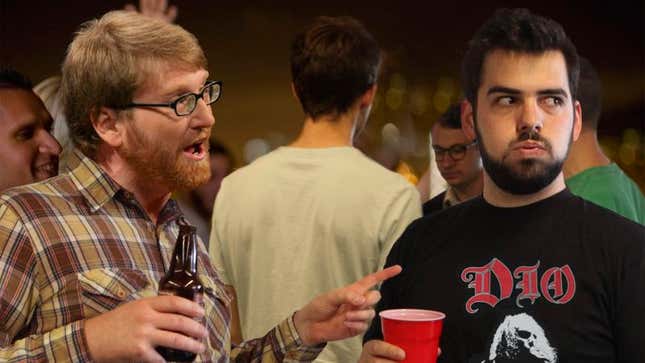
NEW YORK—Author Chuck Klosterman reportedly cornered a guy who was wearing a Dio shirt at a party Thursday evening and dominated an exhaustive discussion on the metal band, addressing the group’s fantasy themes, deconstructing lyrics, and expounding a variety of related and semi-related topics.
According to several eyewitness accounts, Klosterman encountered the party guest in a black T-shirt emblazoned with the Dio logo at approximately 9:30 p.m., walked directly over to the man, and immediately launched into a treatise on how the band’s 1983 debut release Holy Diver represented the purest manifestation of heavy metal music, “or, at least, our collective idea of what heavy metal music means.”
“Hey, man, it’s interesting that you’re wearing that,” Klosterman was overheard saying as he darted toward the man. “When Dio put out Holy Diver it really filled a void left by the band’s contemporaries Motörhead and Judas Priest, and yet there’s a sly sense of almost half-parody coursing through the record, too, where it’s almost saying ‘This is a record that knows what you expect of it, and is willing to both satisfy and subvert those expectations.’”
“And yet, with its expert power riffs and and its sense, lyrically, of overcoming Stygian forces, it also completely rocks, and thus sort of fulfills its raison d'être,” added the 42-year-old author.
Klosterman, who reportedly never introduced himself or asked for the man’s name, reflected on the “winking aggression” of Ronnie James Dio’s lyrics, which he acknowledged were emblematic of an escapist realm that reflected the needs and desires of a largely working-class fan base.
Though the man reportedly thought the conversation had concluded after 45 minutes, Klosterman moved closer, blocked him from leaving with his body, and started to talk at length about Dio’s bassists Jimmy Bain, Teddy Cook, Jeff Pilson, Larry Dennison, and Rudy Sarzo, and how the band’s shifting lineup “only further emphasized what remained constant” about the group.
“Now, of course it’s easy to recognize Jimmy Bain’s influence on Holy Diver, The Last In Line, Sacred Heart, Dream Evil, Magica, and Killing The Dragons, even as he’s being subsumed into a concept that is, if we’re being honest, larger than his own skill set,” Klosterman said to the man who appeared to desperately search the room for help. “But Jeff Pilson, who came from Dokken, may have had an even more significant impact on the band’s sound while recording Strange Highways, Angry Machines, and Master Of The Moon, in that I think you can actually hear him actively fighting against the group’s core identity in a way that creates tension.”
“It’s also interesting that Rudy Sarzo has a Black Sabbath connection since he had previously played in Ozzy Osbourne’s solo act,” added Klosterman. “In a way, he has the most impressive metal pedigree of all the bassists, if you also consider his work with Quiet Riot and Whitesnake.”
The man, who did not speak one word during the entire exchange, reportedly purchased the Dio shirt at a thrift shop.
Sources confirmed that Klosterman continued to invade the personal space of the man who tried to look away but was unable to escape the columnist’s ceaseless monologue, which swiftly hit on subjects such as the symbolic elements of Dio’s stage show, the significance, and “narrative continuity,” of recruiting former members of the groups Black Sabbath, Rainbow, and Sweet Savage, an obscure Canadian teen television drama, a road trip he took in the summer of 1995, and the inherent comic dualism of the Dio logo, which is Italian for “God” and spells out the word “devil” when viewed upside down.
“Perhaps what’s most intriguing is how the band’s persona and mythos essentially depicts a rock god, whether or not that distinction was earned,” Klosterman reportedly told the man who nodded, then tried to walk away, but was followed by the essayist. “Part of the reason I find the group so fascinating is that Dio’s career was peaking at roughly the same time as Sylvester Stallone’s, who had just co-written and starred in the smash-hit First Blood. I don’t believe that it would be arbitrary to include Arnold Schwarzenegger in this discussion, considering he had just achieved worldwide fame with his role in the film Conan The Barbarian. It’s interesting; all of those artists were sort of toying with, or rebranding in a sense, our own popular sense of machismo. It’s also probably worth mentioning that the animated series He-Man And The Masters Of The Universe had gone into syndication during this period as well. And in that sense, the muscular riffs and bravado of Dio’s brand of fantasy-infused metal are sort of right in step with the zeitgeist of the early 1980s, during which we saw our cultural heroes striking full masculine poses in the shadow of the Cold War. We must ask ourselves: What was the affection for the action hero—be it in cinema, television, or music—at the time? Why did we long for the archetype, and why, to a certain extent, do we still long for that archetype? How is “macho,” as a cultural signifier, being defined? How is it being confined? These larger-than-life and over-the-top heroes were boarding on cartoonish. And in that vein, Dio does verge on parody. But is it genuinely a knowing parody? Oh, man, I’m going to go grab a fresh drink. Let’s continue this conversation in a minute.”
Eyewitnesses told reporters that the man promptly fled the party, pushing several guests out of his way while frantically attempting to exit the apartment.